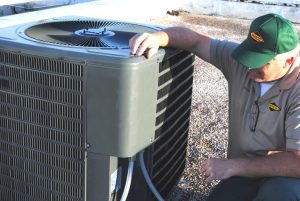How Much Training Does an HVAC Technician Need?
 When you hire a contractor to work on your HVAC system, you just assume that the technician sent to your home will be properly trained. But what does that mean? How much training is required to work properly on these complicated pieces of equipment? This article will take a closer look at this topic.
When you hire a contractor to work on your HVAC system, you just assume that the technician sent to your home will be properly trained. But what does that mean? How much training is required to work properly on these complicated pieces of equipment? This article will take a closer look at this topic.
To hire Greensboro HVAC technicians that you can be sure are trained to meet all accepted standards, turn to Berico. A leader in HVAC in Greensboro, NC and the surrounding area, Berico is always up to the challenge and will make sure every technician who works on your property is fully qualified to get the job done.
The Importance of Sufficient Training
It is crucial to make sure any technician that works on your system is fully trained and ready for the challenges that they will face. This is important for a variety of reasons, but first and foremost is safety. HVAC equipment can be dangerous when not handled correctly, so proper training is needed to make sure repair and maintenance work is done safely and no one is put in jeopardy.
Also, good training means your equipment will be treated with care, and the work will be a success in the end. You don’t want to have low-quality work take away from the performance of your system, and you certainly don’t want to reduce the lifespan of the equipment by not hiring the right technicians. Go with a trusted name in the industry so you don’t run into any unexpected problems.
Various Licensing Levels
There are three general levels of HVAC licensing offered in the state of North Carolina. Those are referred to as H1, H2, and H3. The basic licensing level, and the one you will want to be sure is in place for a technician working on your home, is H1. This permits the license holder to do work on single-family homes, and other buildings like commercial and industrial facilities (if the technician has a Class 1 license within the H1 category).
Going up to the H2 and H3 levels of licensing is relevant for technicians who plan to work on larger systems. For example, someone working on a forced air system over 15 tons will need to have an H2 license to do that work legally.
Passing the Exam
There is also a licensing exam to consider for those who work in this industry. With that said, technicians need to start working in the field to accumulate the necessary experience to take the exam and secure their licenses. The specific requirements vary depending on the type of license in question, but for a contractor exam, it’s necessary to have two years of work experience to sit for the exam, while the threshold is 18 months for a technician exam.
As a customer, you don’t need to get too caught up in the details of HVAC licensing in North Carolina, as long as you know that your chosen contractor is fully qualified to do the job on your property. For that, simply call Berico and you’ll be assured of working with a talented and experienced technician each and every time.

